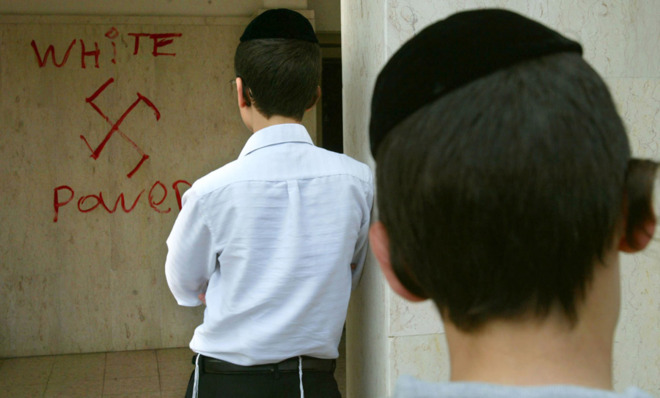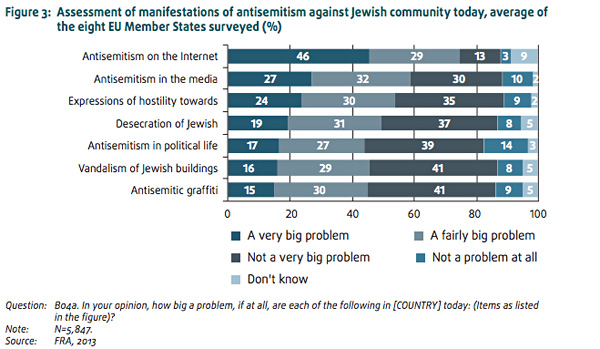The disturbing resilience of anti-Semitism
Reports of anti-Semitism surface from New York to Eastern Europe

A free daily email with the biggest news stories of the day – and the best features from TheWeek.com
You are now subscribed
Your newsletter sign-up was successful
Tomorrow, Germany will confront a terrible historical marker: The 75th anniversary of Kristallnacht, the massive pogrom launched against the country's Jewish population that resulted in at least 91 deaths, thousands of people sent to concentration camps, and more than 1,000 Jewish businesses burned to the ground.
That was seven decades ago. Still, according to a report by the Vienna-based European Union Agency for Fundamental Rights (FRA), anti-Semitism remains a reality for many Jews in Europe. The survey questioned 5,847 people who identified as Jewish in Belgium, France, Germany, Hungary, Italy, Latvia, Sweden, and the U.K. The results are disturbing (via Der Spiegel):
76 percentRespondents who said they had noticed an uptick in anti-Semitic hostility in their home country over the last five years.
66 percentRespondents who said anti-Semitism was still a problem in Europe.
46 percentRespondents who said they were afraid of being verbally harassed because they were Jewish.
Those numbers led the FRA to conclude that "while member states have made sustained efforts to combat anti-Semitism, the problem is still widespread."
The Week
Escape your echo chamber. Get the facts behind the news, plus analysis from multiple perspectives.

Sign up for The Week's Free Newsletters
From our morning news briefing to a weekly Good News Newsletter, get the best of The Week delivered directly to your inbox.
From our morning news briefing to a weekly Good News Newsletter, get the best of The Week delivered directly to your inbox.
The study was limited to Europe. Anti-Semitism, however, is not.
In Pine Bush, N.Y., three Jewish families are suing their school district for "pervasive anti-Semitism and indifference by school officials," reports The New York Times. Jewish students reportedly had to deal with swastikas that "seemed to be everywhere," according to the Times, as well as verbal harassment and acts of physical intimidation and violence.
The Times describes the experience of one student, identified only as D.R.:
D.R. was in sixth grade when a school-sponsored ski trip turned ugly. A boy on the bus ride home asked if he was Jewish, and when D.R. answered yes, a group of students began taunting him with slurs, he testified. One boy then repeatedly punched him in the stomach "until I was ready to throw up," D.R. said in his account… D.R., now 16 and a junior, testified that early this year, he saw four or five Pine Bush students goose-stepping and high-fiving with Nazi salutes in the hallway. [New York Times]
"Every day at the high school," another girl testified, "I would go in, and I would just have the worst day of my life."
A free daily email with the biggest news stories of the day – and the best features from TheWeek.com
The Times reporter, asking residents of Pine Bush if they had noticed an anti-Semitism problem, came across 42-year-old John Barker, who remarked, "Who really wants them here? They don't belong here."
Sadly, that kind of verbal hatred has been complemented by the rise of the internet, which, according to the FRA survey, has become the main forum for anti-Semitism in Europe.

The explanation of why anti-Semitism has persisted from the early days of Christianity to the Internet Age is long and complex. (Anthony Grafton, writing in The New Republic, does a decent job of it reviewing David Nirenberg's Anti-Judaism.)
Regardless of its historical origins, the fact remains that the problem is actually getting worse.
"Anti-Semitism is acceptable again," Anetta Kahane, director of a German anti-discrimination group, told the BBC. "It must be said clearly — those who say something anti-Semitic tacitly legitimize physical attacks on Jews."
Susan Nota, a volunteer for the Jewish Federation near Pine Bush, put it another way.
"I teach about the Holocaust," she said to the Times. "I know what can happen when people look the other way."
Keith Wagstaff is a staff writer at TheWeek.com covering politics and current events. He has previously written for such publications as TIME, Details, VICE, and the Village Voice.
-
 The Olympic timekeepers keeping the Games on track
The Olympic timekeepers keeping the Games on trackUnder the Radar Swiss watchmaking giant Omega has been at the finish line of every Olympic Games for nearly 100 years
-
 Will increasing tensions with Iran boil over into war?
Will increasing tensions with Iran boil over into war?Today’s Big Question President Donald Trump has recently been threatening the country
-
 Corruption: The spy sheikh and the president
Corruption: The spy sheikh and the presidentFeature Trump is at the center of another scandal